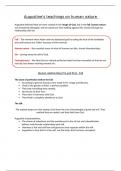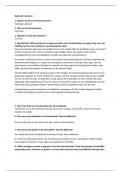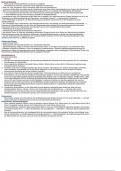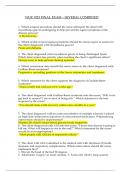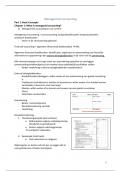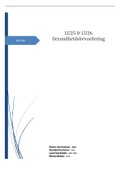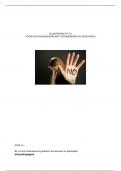Augustine believed that we were created in the image of God, but in the fall, human nature
was irrelatively damaged, and we spend our lives battling against this, shown through our
relationship with sin.
Fall – The moment when Adam and eve disobeyed god by eating the fruit of the forbidden
tree and humans are ‘fallen’ because of this moment.
Human nature – the essential sense of what all humans are like, shared characteristics.
Sin – turning away the will of God.
Concupiscence – the idea that our natural perfected state has been wounded so that we are
not bad, but always inclining towards sin.
Human relationships Pre and Post - Fall
The state of perfection before the fall:
According to genesis humans were made in his ‘image and likeness.
Lived in the garden of Eden, a perfect paradise.
They had everything they needed.
No threats to their lives
They were in harmony with God.
They lived in complete obedience to God.
The fall:
The serpent temps eve into eating a fruit from the tree of knowledge of good and evil. They
realised they are naked, and they hide from God.
Augustine interpretations:
The shame of nakedness and the punishment to Eve of lust and subordination
defines male-female relationships post-fall.
Harmony is lost and self-love and generous love separate within the will.
Augustine is clear that it is the will, not the body, that has been corrupted.
, Original sin and its effects
Original sin – the state that humans were brought into by the fall, which was the first sin.
Effects on the will =
For Augustine original sin which came into the world at the fall, characterises
human nature. He says that the will continues in its disharmony and therefore
rebels. This is illustrated sexually: a man loses his ability to control his sexual
desires.
Other thinkers see original sin as describing human nature, but Augustine saw it as changing
it; therefore, from the fall onwards no human being was truly good, however much they do
things.
Augustine believed original sin is passed on through generations during sexual intercourse
because all humans are united from being descendants of Adam and eve.
Described as a double death:
Killing the friendship between God and humans
Becoming mortal, following the fall
Strengths Weaknesses
Sexual desires seem to play a Augustine’s account relies on literal
disproportionate part in human life. interpretation of the creation story and it
could be unfair for people to be tainted by
and act for so long.
The Roman catholic church says that There doesn’t seem to be space for humans
humans re divided and need to help of God to develop spiritually or morally inn
to develop Augustine’s account
Augustine’s view seems to correspond with Evolution implies that we are headed
our own experiences in life, we are torn in towards perfection (mutating into better
different directions, even when they are species over time) not away from it
wrong.
Freud also said that the libido is central to Dawkins said that Augustine's negative
the motivation of humans approach has led to a lot of human
suffering as well as an over-emphasis on
sexuality.
Can humans ever be morally good?
Augustine makes it clear that everyone is corrupted by the event.
He says that if we seek god’s grace, we can be saved.
GODS GRACE: God's generous, undeserved, and free act of love
to the world
Is Augustine’s view of human nature pessimistic or optimistic?
, Pessimistic – seeing the worst aspect of things.
We are tainted from the moment we are born.
There is little opportunity to develop away from our fallen states and no total escape
from it.
Where there is such opportunity, it is only to pursue earthly peace, rather than tire
heavenly desire.
Concupiscence is an extremely strong force that we cannot escape.
His teachings about predestination and election suggest that hell is a certainty for
some from the moment of birth.
We are not truly free beings.
Optimistic – seeing the best aspect of things.
God’s grace is totally given to underserving humanity.
Jesus died on the cross to save humans from sin: he redeemed humans – paid the
price for their sinful natures.
The church exists to help Christians on their journey, starting with the important
moment of baptism that keeps the wound of original sin closed.
Faith exists to point people in the direction of summum bonum.
Scholars
Original sin and suffering, God created the world but not evil?
For Against
Idea evil can arise when people PELAGIUS:
exercise free will fits in with what Human nature = humans can’t have
we see in the world around us flawed nature. If we did God would
be commanding the impossible
when he asks humans to be holy.
Death = biologically necessary
Grace = God’s grace assists people
to do the right thing but humans
carry out the actions.
AQUINAS: VARDY:
Supports Augustine, natural evil is No way to justify excess suffering
only evil from our perspective i.e.
and cat eating a mouse
SWINBURNE: MACKIE:
Agrees to an extent, death is a God could of created Humans with
greater good as without it you’d free will who only choose good
never achieve anything as we would
have eternity
Death and the afterlife

